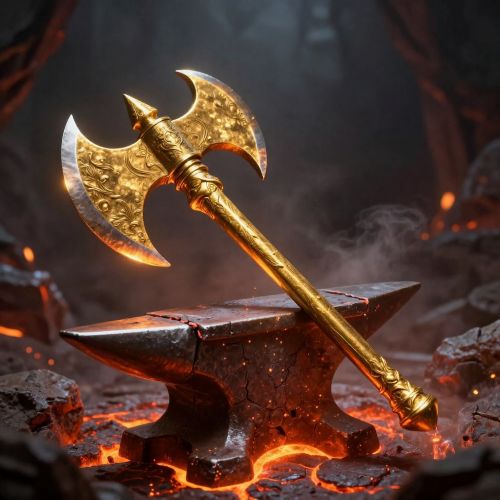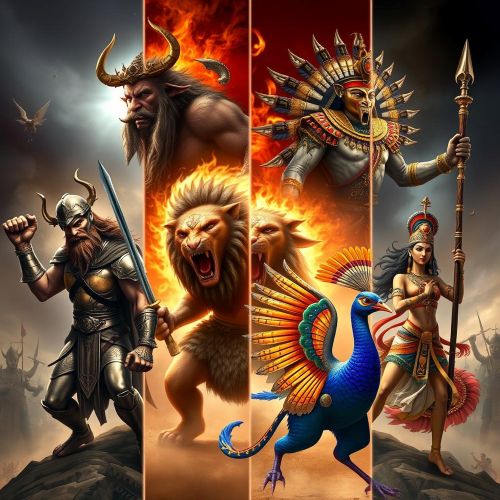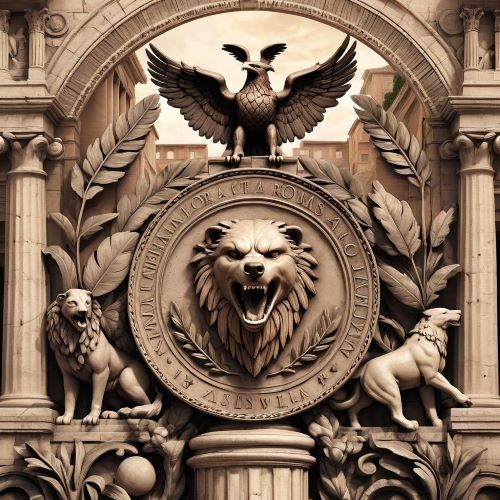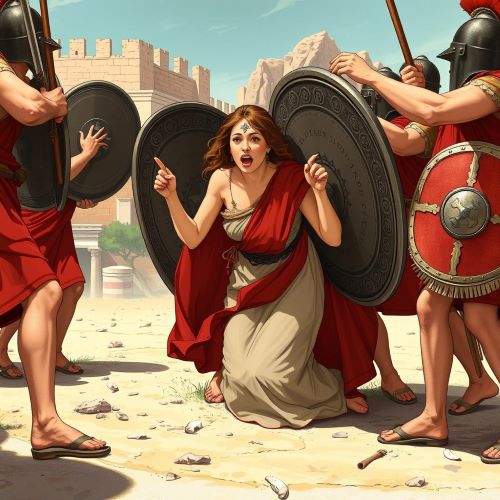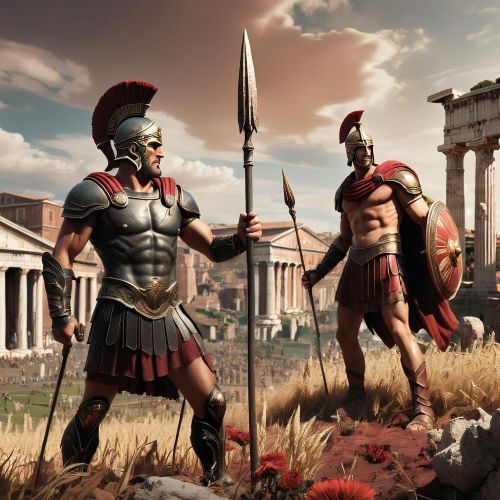
Ares vs Mars: The War Gods of Greece and Rome
Ares and Mars are often spoken of in the same breath. Both are gods of war—Ares in Greek mythology and Mars in Roman tradition—but their roles, reputations, and cultural importance couldn’t be more different. While Ares embodies the raw chaos of battle, Mars stands as a symbol of discipline, protection, and even fertility. Comparing these two gods offers a fascinating glimpse into how the Greeks and Romans thought about war, society, and divine order.
Core Differences
At their core, the contrast is clear:
-
Ares represents bloodlust, chaos, and the destructive power of conflict. His presence signals the brutality and unpredictability of war.
-
Mars represents war tempered with discipline. He was also connected to agriculture and fertility, showing that for Romans, military power was inseparable from stability, prosperity, and civic identity.
The Greeks regarded Ares with suspicion. He was impulsive, reckless, and often humiliated in myths—sometimes defeated by mortals like Diomedes or mocked by gods including Zeus. By contrast, Mars was deeply respected, revered as the father of Romulus and Remus, the legendary founders of Rome. His status made him a central figure in Roman religion and politics, second only to Jupiter.
Role and Traits
Ares was the embodiment of violent, unrestrained combat. His sphere was personal rage and the terror of the battlefield. In Athens, his influence was minimal compared to Athena, goddess of strategic warfare, while Sparta tolerated him more readily because of its militaristic culture.
Mars, on the other hand, combined war with guardianship. In early Roman belief, he was tied to agriculture, embodying the idea that the same god who defends the city also protects its fields. His martial qualities were dignified and ethical, reflecting Roman ideals of loyalty, duty, and service to the state.
This made Mars a far more integrated figure in Roman religion than Ares ever was in Greece. He wasn’t just a war god—he was a protector of Roman identity and prosperity.
Cultural Personality
Greek mythology paints Ares as a volatile force. He is hot-headed, destructive, and disliked even by his divine parents, Zeus and Hera. His companions, Phobos (Fear) and Deimos (Terror), reflect his role as the harbinger of dread.
Mars was the opposite: a calm, commanding figure. He symbolized military discipline and state protection, and Romans linked him to agriculture, positioning him as a guardian of both crops and armies. Where Ares was chaos, Mars was order.
Reputation and Worship
The Greeks had little affection for Ares. His worship was localized and often edged with fear, concentrated in Thrace and Sparta. He was overshadowed by Athena, who represented intelligence and strategy in warfare, qualities the Greeks admired more.
The Romans, however, exalted Mars. He had numerous temples, like the grand Temple of Mars Ultor, and festivals such as the Feriae Marti in March (a month named after him). He was invoked as the father of Rome itself, tying him directly to the city’s origin and destiny.
Symbols and Iconography
Both gods are depicted with armor, spears, and shields, but their imagery carries different tones.
-
Ares is shown as youthful, brash, and aggressive, often accompanied by Phobos and Deimos. His posture is wild, emphasizing chaos.
-
Mars is portrayed as mature and stately, embodying gravitas and dignity. Some depictions even merge agricultural motifs—like a flower or plow—with his warrior’s spear.
Where Ares radiates raw energy, Mars exudes calm authority.
War Approach
Ares embodies the storm of battle—personal combat, rage, and destruction. His mythology shows him as reckless, unpredictable, and often a liability to allies.
Mars, however, represents organized warfare. He is the god of disciplined armies, defense of the community, and conquest balanced with order. Romans saw his guidance as ensuring not only victory but also peace and prosperity.
Cultural Interpretation
Greek myths often humiliate Ares. In the Iliad, Zeus calls him “the most hateful of all gods.” His defeats at the hands of mortals reinforced the idea that blind aggression was less valuable than strategic intelligence.
Mars was a moral compass for Romans. In the Aeneid, Virgil invokes him as a noble force guiding Rome’s destiny. Mars was tied to Rome’s state rituals, festivals, and civic identity, ensuring his presence was both respected and celebrated.
Uncommon Differences
Beyond the obvious, several nuanced contrasts emerge:
-
Regional Cults: In Anatolia, some cults of Ares connected him with foresight and fertility—traits absent in mainstream Greek worship. Spartans chained a statue of him to keep victory “captive” in their city.
-
Agricultural Roots: Mars began as an agricultural deity, later evolving into Rome’s war god. This dual role never existed for Ares.
-
Temporal Links: Mars was tied to cycles of time and renewal, evident in festivals like Mamuralia. Ares had no such association—he was timeless chaos.
-
Syncretism: Romans fused Mars with Celtic gods of weather and time, while Ares had little cross-cultural integration.
These subtler differences highlight how Mars grew into a multifaceted protector, while Ares remained narrowly defined as the god of violence.
Legacy
The legacy of these two gods mirrors their cultures.
-
Ares was peripheral, feared more than loved. His myths emphasize his instability, and his worship never became central to Greek society. Even in art and philosophy, he symbolized irrational aggression.
-
Mars was foundational. He was not only Rome’s war god but also its father, protector, and moral guide. His temples, festivals, and connection to agriculture and civic life made him indispensable to Roman identity.
In short, Ares was the storm; Mars was the sword and the plow. One symbolized fear, the other represented strength with purpose.
| Aspect | Ares (Greek Mythology) | Mars (Roman Mythology) |
|---|---|---|
| Domain | God of war, chaos, and bloodlust | God of war, agriculture, and civic protection |
| Personality | Hot-headed, impulsive, destructive | Calm, strategic, disciplined |
| Reputation | Generally disliked, feared but not admired | Highly revered, central to Roman identity |
| Mythological Role | Represents reckless violence and personal combat | Symbolizes organized warfare, civic duty, and prosperity |
| Symbols | Spear, shield, helmet; often with Phobos and Deimos (Fear & Terror) | Spear, shield, armor; sometimes paired with agricultural motifs |
| Family Ties | Son of Zeus and Hera; lover of Aphrodite | Father of Romulus and Remus, legendary founders of Rome |
| Cultural Status | Peripheral deity, overshadowed by Athena | Second only to Jupiter; state protector of Rome |
| Worship | Few temples, mainly in Sparta and Thrace | Numerous temples, festivals like Feriae Marti, month of March named after him |
| Legacy | Feared storm of war, symbol of chaos | Sword and plow, noble guardian of Rome |
No posts were found.




